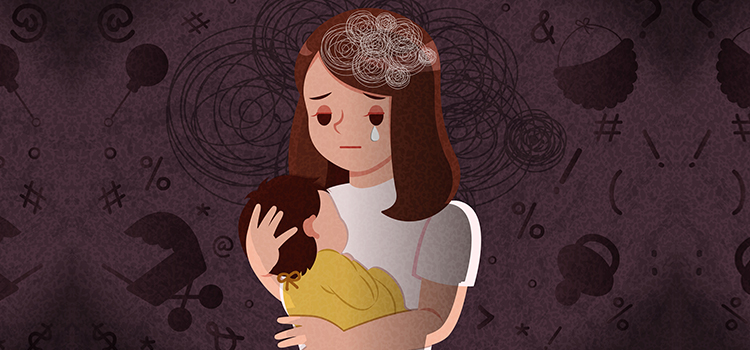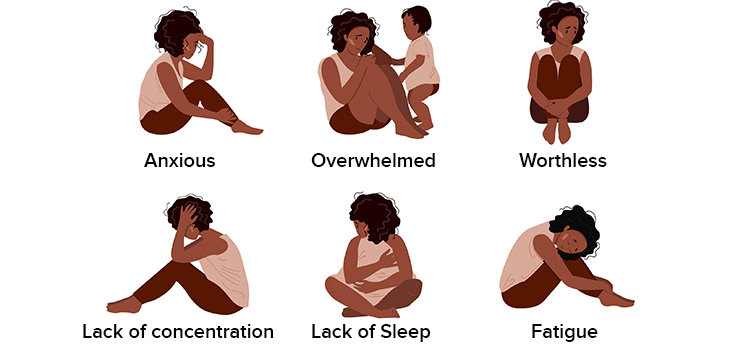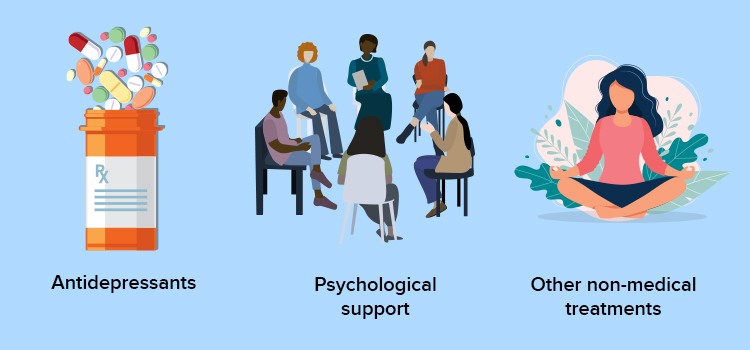The Different side of Motherhood
Postpartum Depression is becoming more and more common. An estimated one in nine new moms experiences it. But more alarming is that one in four women with postpartum depression neglects themselves and their babies. The truth is that depression can mess with your mind and can lead to poor decision-making.

What is Postpartum Depression?
Postpartum Depression (PPD) or baby blues is a mental health illness that often occurs after giving birth. Being a parent is a life-changing process for both parents. Some mothers feel baby blues after giving birth, but with PPD, the feeling of loneliness, anxiety, worthlessness, and restlessness lasts much longer than baby blues.
If you are a new mother and are facing all these feelings, you may have baby blues. These are common and mostly go away within 10 days after the baby is born. But if you're feeling these symptoms even after two weeks then, you should talk to your family and doctor.
Symptoms of Postpartum Depression
Postpartum depression shares many similarities with other types of depression. The only difference is that your anxious and negative thoughts, which are common in depression, are often focused on your newborn baby.
Some of the symptoms of postpartum depression overlap with some common post-birth symptoms.
Symptoms of postpartum depression include:
1. Low mood, crying sessions, irritability
2. Fatigue and low energy– this is common when you have a baby but it gets worse in postpartum depression.
3. Lack of sleep– it’s common to have poor sleep with a baby in the house but in postpartum depression, you may not be able to sleep even when your baby is asleep.
4. Lost of interest– you lost interest in the things that you used to enjoy and admire. You also stop enjoying the playtime with your child.
5. Poor appetite– many women find that their appetite increases when they are nursing and taking care of their newborn. However, in postpartum depression, you may find out that you have little to no appetite.
6. Anxious, Negative, and Guilty thoughts– In postpartum depression, anxious, negative, and guilty thoughts become more common and severe. You start thinking that you’re a bad mother, someone or something will harm your baby. You feel guilt for being depressed and not being enough for your child.
7. Avoiding people– you start avoiding people and don’t want to meet your family or friends.
8. Worthless or Suicidal thoughts– in postpartum depression, you start feeling that you are not worth living and start having suicidal thoughts. If you have an urge to harm yourself, seek crisis support immediately.

Types of Postpartum Depression
1. Baby Blues
Baby blues commonly known as Postpartum blues– affects 50% to 70% of mothers after delivery. Mothers often have prolonged crying sessions, sadness, and anxiety. These symptoms last up to two weeks or 10 days. Talking to family and friends, exercising and meditating, and eating a healthy diet help in bringing down these symptoms.
2. Postpartum Depression
Postpartum Depression affects 13% of mothers after delivery. PPD can develop exactly after birth or even after a year of birth too. PPD is far more serious than baby blues as it has severe mood swings, anxiety, crying sessions, and even the feeling of disappearing from life. Treatment with therapy and anti-depressing is very effective in PPD.
3. Postpartum Psychosis
Postpartum Psychosis is a severe form of postpartum depression that requires medical treatment immediately. The condition is rare and only affects 0.1% to 0.2% of mothers. PP Psychosis begins in the first three months of childbirth. Symptoms include severe agitation, harm to themself as well as to the baby, paranoia, obsessive thoughts about the baby, etc. Postpartum psychosis requires medical attention since there is a risk of suicide or harming the baby. Treatments usually include psychotherapy and medication.
What causes Postpartum Depression?
There isn’t a single cause for postpartum depression. Many biological, psychological, and social factors can become a cause of depression during the postpartum period.
Some factors that are linked to postpartum depression include:
● Previous or current mental health issues, including depression
● Lack of family, and friend support especially in the postpartum period.
● Experiencing anxiety or depression during pregnancy.
● Any traumatic birth experience
● Bad childhood and strained relationship with parents.
Living with Postpartum Depression
If you have given birth recently and you are feeling restless, sad, anxious, irritable or many other symptoms, you may have postpartum depression, you don’t have to be ashamed of that. Feeling depressed doesn’t mean you are bad or you don’t love your baby. Always remember that many other women also experience PPD.
Here are some things you can do that other mothers find helpful in Postpartum Depression.
1. Talk about how you feel to your family, friend, or to anyone whom you have a special connection with.
2. Take help from your extended family or friends to help you with household chores, childcare, and daily errands.
3. Find something to do for yourself(only for 10 minutes), go on a walk, or meditate.
4. Try keeping a journal and writing down your thoughts and feelings. This is a way to let out your emotions.
5. Eat healthy food.
6. Talk with your doctor about your thoughts and emotions they may prescribe therapy or medication.
Treatment for Postpartum Depression
Treatment for PPD is like every other depression. Support groups, counseling, and medications(antidepressants) can help. Talk to your doctor about your treatment and if you have suicidal thoughts or thoughts of hurting your baby, call help immediately.
If you are breastfeeding, ask your doctor about the benefits and risks of the antidepressants. Your doctor can decide which medications are better for you while nursing your child.

Celebrities like Shilpa Shetty Kundra and MandiraBedi helped the Indian Society to spread awareness about Postpartum Depression by sharing their stories. In an Interview, MandiraBedi said, “As a new mum I faced one issue and I would like to talk about– Postpartum Depression is for real I had it for 6 weeks. I did not fall in love with my baby the moment I saw him. I didn’t. It took me a while to adjust to this new change and it suddenly dawned upon me that my independence is gone, also because I had a baby after 12 years of marriage. I would think that I didn’t sign up for this.
Your hormones make you have these weird conversations with yourself and I was depressed, and it lasted for about 6 weeks. You need the support of your family around you who know that such a thing exists.”
Postpartum Depression is a real issue for millions of women around the world, no matter if they’re celebrities or not. If you’re having feelings of depression, exhaustion, or sadness that you cannot shake off and are affecting your life negatively, reach out to someone you trust. Tell them what’s going on and work through this together. If the person you confide in is not a close friend or family member, ask them if they can help refer you to someone who can assist you with your situation. But above all else, do not let postpartum depression take control and destroy your life.